高中英语二轮复习语法---冠词讲解
- 格式:docx
- 大小:21.87 KB
- 文档页数:8

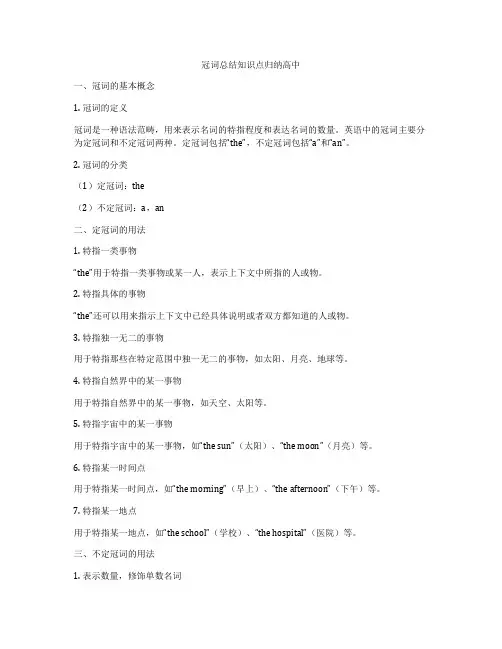
冠词总结知识点归纳高中一、冠词的基本概念1. 冠词的定义冠词是一种语法范畴,用来表示名词的特指程度和表达名词的数量。
英语中的冠词主要分为定冠词和不定冠词两种。
定冠词包括“the”,不定冠词包括“a”和“an”。
2. 冠词的分类(1)定冠词:the(2)不定冠词:a,an二、定冠词的用法1. 特指一类事物“the”用于特指一类事物或某一人,表示上下文中所指的人或物。
2. 特指具体的事物“the”还可以用来指示上下文中已经具体说明或者双方都知道的人或物。
3. 特指独一无二的事物用于特指那些在特定范围中独一无二的事物,如太阳、月亮、地球等。
4. 特指自然界中的某一事物用于特指自然界中的某一事物,如天空、太阳等。
5. 特指宇宙中的某一事物用于特指宇宙中的某一事物,如“the sun”(太阳)、“the moon”(月亮)等。
6. 特指某一时间点用于特指某一时间点,如“the morning”(早上)、“the afternoon”(下午)等。
7. 特指某一地点用于特指某一地点,如“the school”(学校)、“the hospital”(医院)等。
三、不定冠词的用法1. 表示数量,修饰单数名词“a”和“an”用于表示数量的不确定性,修饰单数名词。
2. 泛指一类事物“a”和“an”还可以用于泛指一类事物,表示任何一个、一种、一些。
3. 表示重复出现的动作用于表示重复出现的动作,如“once a week”(一周一次)、“twice a month”(一个月两次)等。
四、特殊情况下的冠词用法1. 特指两者中的一个在表示两者中的一个时,用“the”表示特指。
2. 特指某个人的职业或身份当表示某个人的职业或身份时,也需要使用“the”。
3. 修饰序数词在修饰序数词时,需要使用“the”,如“I am the first one to arrive”(我是第一个到达的人)。
4. 表示特定类别的人群用于表示特定类别的人群时,需要使用“the”,如“the rich”(富人)、“the poor”(贫困者)等。
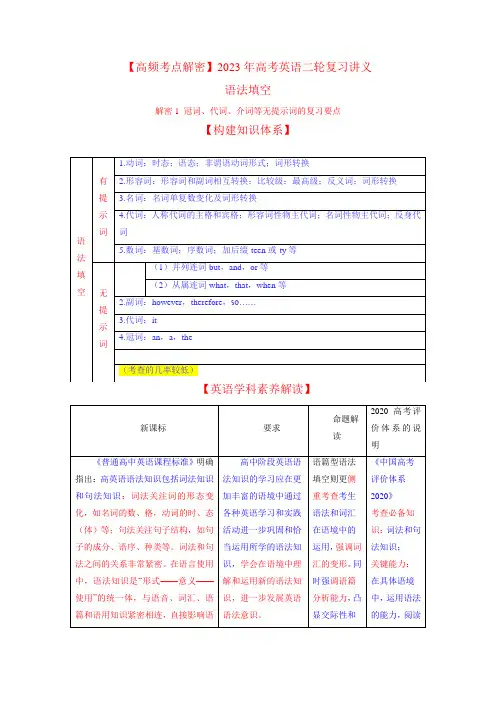


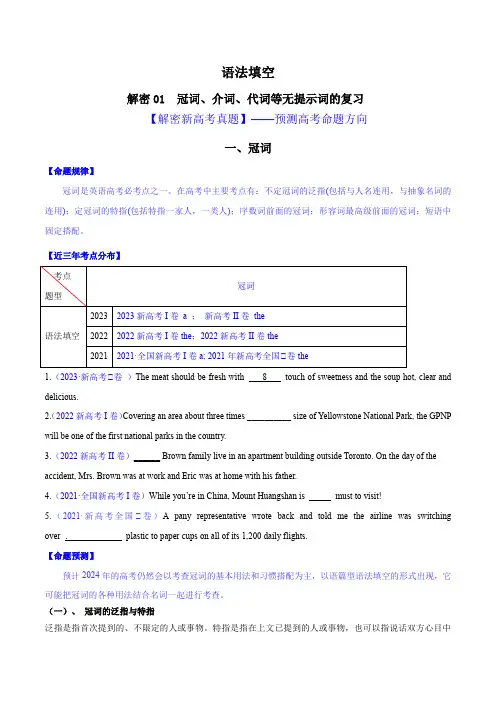
语法填空解密01 冠词、介词、代词等无提示词的复习【解密新高考真题】——预测高考命题方向一、冠词【命题规律】冠词是英语高考必考点之一。
在高考中主要考点有:不定冠词的泛指(包括与人名连用,与抽象名词的连用);定冠词的特指(包括特指一家人,一类人);序数词前面的冠词;形容词最高级前面的冠词;短语中固定搭配。
【近三年考点分布】1.(2023·新高考Ⅱ卷)The meat should be fresh with 8 touch of sweetness and the soup hot, clear and delicious.2.(2022新高考I卷)Covering an area about three times __________ size of Yellowstone National Park, the GPNP will be one of the first national parks in the country.3.(2022新高考II卷)______ Brown family live in an apartment building outside Toronto. On the day of the accident, Mrs. Brown was at work and Eric was at home with his father.4.(2021·全国新高考I卷)While you’re in China, Mount Huangshan is must to visit!5.(2021·新高考全国Ⅱ卷)A pany representative wrote back and told me the airline was switching over .plastic to paper cups on all of its 1,200 daily flights.【命题预测】预计2024年的高考仍然会以考查冠词的基本用法和习惯搭配为主,以语篇型语法填空的形式出现,它可能把冠词的各种用法结合名词一起进行考查。

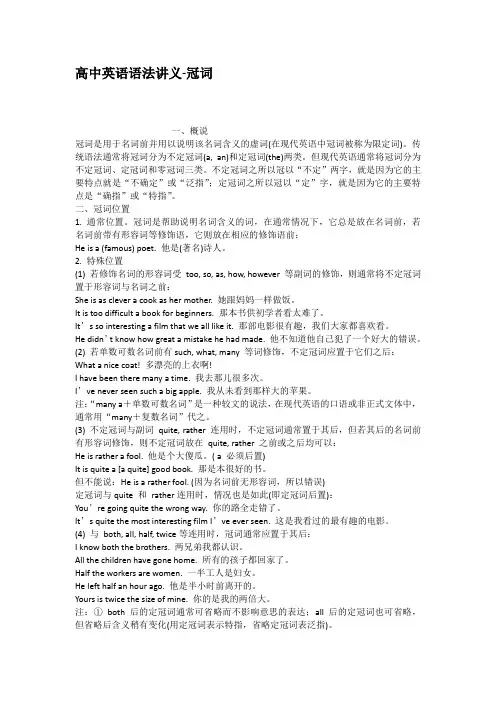
高中英语语法讲义-冠词一、概说冠词是用于名词前并用以说明该名词含义的虚词(在现代英语中冠词被称为限定词)。
传统语法通常将冠词分为不定冠词(a, an)和定冠词(the)两类。
但现代英语通常将冠词分为不定冠词、定冠词和零冠词三类。
不定冠词之所以冠以“不定”两字,就是因为它的主要特点就是“不确定”或“泛指”;定冠词之所以冠以“定”字,就是因为它的主要特点是“确指”或“特指”。
二、冠词位置1. 通常位置。
冠词是帮助说明名词含义的词,在通常情况下,它总是放在名词前,若名词前带有形容词等修饰语,它则放在相应的修饰语前:He is a (famous) poet. 他是(著名)诗人。
2. 特殊位置(1) 若修饰名词的形容词受too, so, as, how, however 等副词的修饰,则通常将不定冠词置于形容词与名词之前:She is as clever a cook as her mother. 她跟妈妈一样做饭。
It is too difficult a book for beginners. 那本书供初学者看太难了。
It’s so interesting a film that we all like it. 那部电影很有趣,我们大家都喜欢看。
He didn’t know how great a mistake he had made. 他不知道他自己犯了一个好大的错误。
(2) 若单数可数名词前有such, what, many 等词修饰,不定冠词应置于它们之后:What a nice coat! 多漂亮的上衣啊!I have been there many a time. 我去那儿很多次。
I’ve never seen such a big apple. 我从未看到那样大的苹果。
注:“many a+单数可数名词”是一种较文的说法,在现代英语的口语或非正式文体中,通常用“many+复数名词”代之。
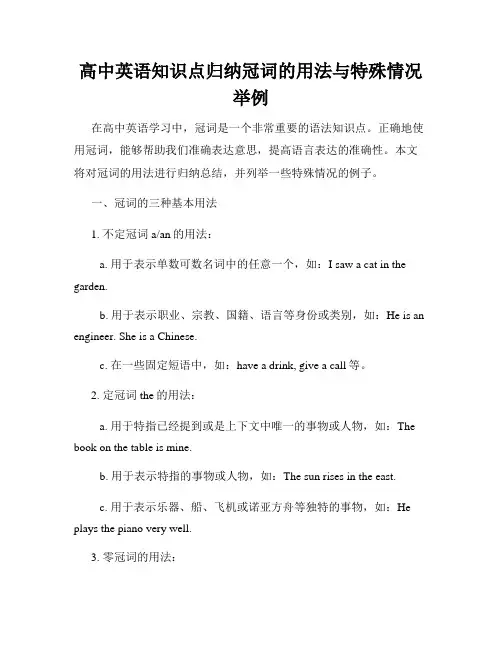
高中英语知识点归纳冠词的用法与特殊情况举例在高中英语学习中,冠词是一个非常重要的语法知识点。
正确地使用冠词,能够帮助我们准确表达意思,提高语言表达的准确性。
本文将对冠词的用法进行归纳总结,并列举一些特殊情况的例子。
一、冠词的三种基本用法1. 不定冠词a/an的用法:a. 用于表示单数可数名词中的任意一个,如:I saw a cat in the garden.b. 用于表示职业、宗教、国籍、语言等身份或类别,如:He is an engineer. She is a Chinese.c. 在一些固定短语中,如:have a drink, give a call等。
2. 定冠词the的用法:a. 用于特指已经提到或是上下文中唯一的事物或人物,如:The book on the table is mine.b. 用于表示特指的事物或人物,如:The sun rises in the east.c. 用于表示乐器、船、飞机或诺亚方舟等独特的事物,如:He plays the piano very well.3. 零冠词的用法:a. 用于泛指复数名词或抽象名词,如:Dogs are loyal animals.Love is a beautiful thing.b. 用于表示一日三餐、运动、学科等无需特指的名词,如:I have breakfast at 7:00.c. 在复合名词中,如:a five-star hotel, a three-hour journey等。
二、冠词的特殊用法及举例1. 与序数词连用:a. 第一、第二等表示顺序的词前加定冠词the,如:I live on the second floor.b. 表示顺序的词前不加冠词,如:She is in class one.2. 与形容词连用:a. 在提到一类人时,如职业、国籍、宗教等概念时,前面使用定冠词the,如:the rich, the poor等。
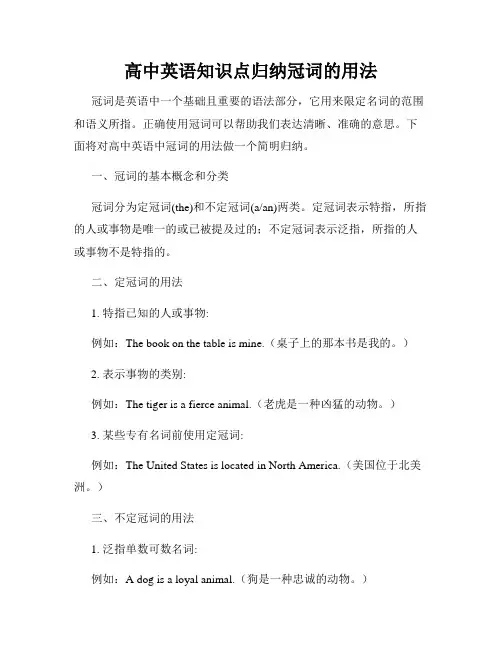
高中英语知识点归纳冠词的用法冠词是英语中一个基础且重要的语法部分,它用来限定名词的范围和语义所指。
正确使用冠词可以帮助我们表达清晰、准确的意思。
下面将对高中英语中冠词的用法做一个简明归纳。
一、冠词的基本概念和分类冠词分为定冠词(the)和不定冠词(a/an)两类。
定冠词表示特指,所指的人或事物是唯一的或已被提及过的;不定冠词表示泛指,所指的人或事物不是特指的。
二、定冠词的用法1. 特指已知的人或事物:例如:The book on the table is mine.(桌子上的那本书是我的。
)2. 表示事物的类别:例如:The tiger is a fierce animal.(老虎是一种凶猛的动物。
)3. 某些专有名词前使用定冠词:例如:The United States is located in North America.(美国位于北美洲。
)三、不定冠词的用法1. 泛指单数可数名词:例如:A dog is a loyal animal.(狗是一种忠诚的动物。
)2. 在表示职业、身份、国籍等的名词前面使用不定冠词,表示“某个”:例如:I want to be a doctor when I grow up.(我长大后想当医生。
)四、冠词的特殊用法1. 在序数词、形容词最高级前使用定冠词,表示特指:例如:He won the first prize in the competition.(他在比赛中获得了第一名。
)2. 在表示一日三餐或某些节日前使用定冠词:例如:They always have breakfast at home.(他们总是在家吃早饭。
)五、不用冠词的情况1. 名词前有物主代词、指示代词等修饰时,不使用冠词:例如:My sister is a teacher.(我的姐姐是一名教师。
)2. 不可数名词、抽象名词、学科名词及球类、体育项目等专有名词一般不用冠词:例如:He is good at playing football.(他擅长踢足球。

高三二轮语法复习——冠词一、定冠词the1.特指。
(说话双方都知道的人或事物。
上文提到的人或事物。
有修饰限定的词。
)I ate a sandwich while I was waiting for the 20:08 train.I like the color of your skirt. It’s a good match for your blouse.I have learned that it’s taking a long time to become the person I want to be.2.与名词相关的特殊用法1)世界上独一无二的事物the universe ; the sun ; the moon2)发明物Alexander Graham Bell invented the telephone in 1876.3)乐器(中国民族乐器除外)play the violin4)身体部位(固定搭配)hit/strike sb on the headhit/strike sb in the faceseize/take sb by the armbe red in the face / be lame in the right leg / be blind in the left eye 5)方位名词The North is colder than the South.To the northeast of Nanjing lies Yangzhou.6)计量单位by the hour / day / dozen / pond / yardAs a rule, domestic servants doing odd jobs are paid by the hour.特例:by weight / size/ timeMeat is sold by weight.7)普通名词用作专有名词a)江河湖海洋、运河、山脉、群岛、海峡、沙漠the English Channel / the Hawaiian Islands / the Red Seathe Sahara Desert / the West Lake / the Persian Gulfthe Tian-shan Mountainsb)国家党派、组织机构、建筑、报刊、朝代the Capital Airport / the Times / the Song Dynastythe World Trade Center / the Spring and Autumn Period 8)集体名词前表示阶层或整体the working class / the police / the public / the Britishserve the people heart and soul3.与形容词相关的特殊用法1)the + adj. 表示一类人Don’t envy him. Soon he will be among the unemployed.2)t he more…, the more…3)the +序数词 & 最高级4)the + 比较级,表示二者之最,特定的一个。
He is the taller of the twins.4.the +姓氏复数,表示一家人。
The Smiths5.in the 1990s6.用在very / only / right / following / same 之前和just 之后He said he was the only person in his office who was invited to the ball.7.固定搭配all over the worldat the beginning / end ofat the same timein the form/shape ofon the phonein the wayon the contraryfor the time beingto the pointin the distancethe other daymake the best / most ofon the spotnot in the leastat the moment二、不定冠词 a / an※a 和an 的区别_____ university /_____ useful tool /_____one-eyed dog / _____European car_____ hour / an honest boy / _____ X-ray / _____ ugly man / _____ honor1、1) =one 指第一次提到的人或物,表示说话人认为没必要或不需要具体说明是哪一个。
I will return in a day or two.A square has four sides.2) =per 表示“每一”,用在一些表示时间、长度、重量等单位的名词前。
He earned 50 dollars an hour as a translator.3) = the same 用在介词of后面的名词前表示同一性。
The students standing there are of an age. (=of the same age)4) = some / a certain 与人名等专有名词连用,表示“一个叫…的人”、“某一个”,表示不定指的情况或类似的一个。
I can’t tell you the way to the Wilsons’ because we don’t have a Wilson here in thevillage.2、 a / an +描述性形容词+独一无二的物质名词或某些抽象名词或日期、月份、季节、三餐a full moon / a peaceful world / a new Liaoning / a heavy raina hot summer / a big dinner / a cold March3、抽象名词具体化a preference / a surprise / a failure4、 a / an+序数词,表示“又一,再一”。
He missed the gold in the high jump, but will get a second chance in the long jump.5、a/ an +比较级,表示“再,更...”;This shirt is too large for me. Would you show me a smaller one?6、most 前用不定冠词时,most 相当于very的意思It is a most difficult job.7、表示整体。
a needle and threada table and chaira knife and forka writer and translator8、同源宾语live a luxurious lifedream a terrible dreamdie a heroic death9、固定搭配a great deal ofa number ofall of a suddenfor a whileas a matter of factat a distanceat a speed ofgo for a walkdo a good deedhave a breakhave a fever / temperature / coldhave a lookin a wordhave a word withmake a livingonce in a whilego on a dietat a losshave a gift forhave a population ofget a lift / ridea pile / flood / mass / series ofa waste of timea matter of life and death三、零冠词1、不可数名词、复数名词表泛指。
My father went to his doctor for advice about his diabetes.He like to read autobiographical novels.2、名词前已经有限定词修饰,如this / her / any / whose等。
She is not my type of woman.He went to some place in France.Each student must hand in his exercise book.3、一些名词前用法口诀月、季、星期、节假、洲,称呼、头衔、职务前;三餐、球类、颜色语,学科、棋类by方式。
注:1) 在称呼语前及表示人的职位头衔身份的名词在句中做表语,补足语,及同位语时不用冠词。
He is dean of the department.2) I’ve marked the corrections in red.3) 表示语言时,区分languagein English / Germanthe English language4) 介词by后面表示运输、通讯等方式的词时不用冠词。
by car / by air / by telegram / by law / by hand试比较:in the car / according to the law / with one’s hand4、不含有普通名词的专有名词,如人名、地名、国家名、车站、公园、机场、街道等。
Lincoln Street / Tsinghua University / Birmingham Airport / Hyde Park5、句式1) Word came that...2) turn 作系动词,表示变成。
Has he turned scientist? (=become a scientist)3) sort of / kind of / type of4) 成对名词day after day / day and night / from time to timelittle by little / shoulder to shoulder / hand in hand5) 独立主格The teacher came in, book in hand.The teacher came in, a book in his hand.The teacher came in, with a book in his hand.6) as 表示虽然引起的倒装句Child as he is, he can speak Japanese, French and German.Young girl as she is, she knows a lot about how to behave well.7) be of + n.This sort of wine is of high quality and sells well all over the world.You’ll find this map of great value in helping you to get around London.It’s of great significance to learn English well.6、固定搭配come into use / beingput... into practicehave mercy onmake progressmake use ofpay attention tosentence sb. to deathtake care oftake pride intake medicine四、冠词不同意义不同的情况1、有冠词表本意,无冠词表引申意go to the school / go to schoolat the table / at tablego to the church / go to churchgo to the prison / go to prisonin the bed / in bedin the class/ in classin the office / in officein the open / in openleave the school / leave schoolby the sea / by sea2、有冠词表被动,无冠词表主动in the charge of / in charge ofin the possession of / in possession oftake the advice / take advice3、意义完全不同out of the question / out of questionin the case of / in case ofon the earth / on earthin the front of / in front ofin sight of / in the sight oftake place / take the place of4、其他the number of / a number ofhave a word with / have words witha singer and dancer / a singer and a dancera second time / the second timea most beautiful city / the most beautiful cityin the way / in a way。